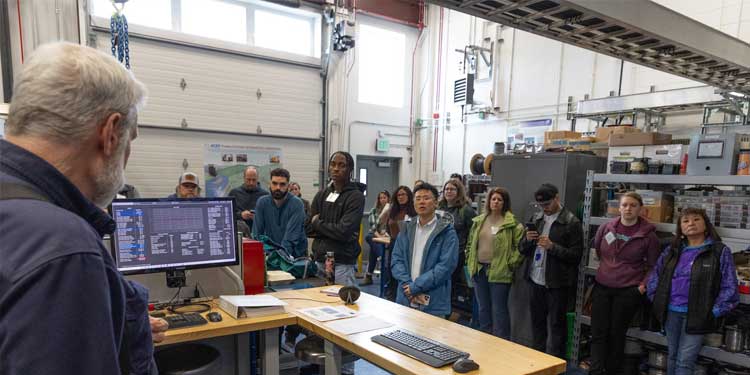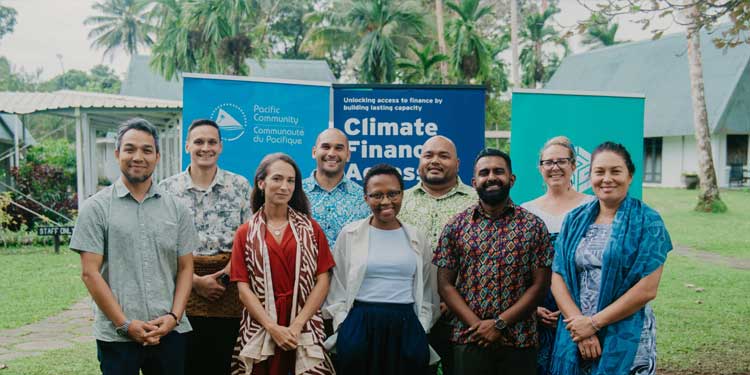Summer 2025
IMPACT REPORT
RMI’s vision of a clean energy future commits us to THINK bigger, DO boldly, and SCALE globally.
Download
Manage your subscriptions to RMI emails. Let us know your specific interests, and we'll keep you updated accordingly.
IMPACT SPOTLIGHT

Built to Weather the Storm — How RMI Is Future-Proofing Solar
In the summer of 2024, Hurricane Beryl — the earliest Category 5 hurricane ever recorded in the Atlantic — ravaged parts of the Caribbean, including solar arrays on the Grenadine islands. The destruction underscored a critical truth: as solar power becomes a lifeline for island nations, ensuring its resilience isn’t optional, it’s essential.
RMI’s Solar Under Storm III report, released in June 2025, marks the third installment in a vital series of reports spanning seven years. Each report builds on field investigations and engineering analysis to provide best practices for hurricane-resilient ground-mount solar photovoltaic (PV) systems. The latest edition is the most comprehensive yet, drawing lessons from three solar arrays directly impacted by Hurricane Beryl and offering updated guidance based on evolving technologies, design codes, and field-tested data.
Continue Reading
The stakes couldn’t be higher. The Caribbean is rapidly transitioning from fossil fuels to solar power — over 90 percent of utilities in the region now deploy solar, and some islands generate more than 90 percent of their electricity from it. As these clean energy systems replace diesel, their reliability, especially in the face of intensifying storms, determines whether communities have power when they need it most.
Solar Under Storm III contrasts projects that followed previous RMI recommendations with those that didn’t. One array built with best practices remained structurally sound; another, lacking key design features, suffered catastrophic damage. These outcomes reinforce the value of rigorous standards and offer clear guidance for improving survivability across four key areas: module mounting, structural racking, foundation design, and electrical systems.New to this latest report is a deeper analysis of low-cycle fatigue in panel frames, a type of failure not seen in prior reports but responsible for 95 percent of system damage in one site after Beryl. Also emphasized are topographical risks, component corrosion, and lateral loads — issues that can jeopardize even well-designed systems.
Beyond technical fixes, the report calls for stronger collaboration. It encourages solar stakeholders to coordinate on manufacturing standards, share test results, and engage with forums like the PV Resiliency Working Group hosted on CAREC (Caribbean Renewable Energy Community), a community of energy professionals and organizations supported by the Caribbean Electric Utility Services Corporation. This collective action is key to building an industry that not only mitigates climate change but also withstands it.
Over three editions, the Solar Under Storm series has become a go-to resource for solar developers, utilities, engineers, and policymakers across the Caribbean and other hurricane-prone regions. It offers more than engineering specs — it offers a blueprint for adaptation.
As climate change fuels increasingly extreme weather, even in places unaccustomed to such threats, the insights from Solar Under Storm extend far beyond the Caribbean. From coastal nations to inland communities contending with increasingly extreme weather, these recommendations are setting the global standard for what resilient solar looks like in a changing world.
SUPPORTER SPOTLIGHT

“George was a man of rare depth — thoughtful, farsighted, and quietly courageous. His support helped us challenge outdated assumptions in the global energy conversation, and his final gift ensures that work will continue. We’re deeply honored by his trust and his vision.” — LENA HANSEN, CHIEF STRATEGY OFFICER, RMI
George Krumme — WWII hero, scientist, and writer — passed away in July 2024 at age 101, leaving a $1 million bequest to RMI’s Strategy team. A longtime supporter, George believed deeply in confronting climate change with courage and clarity. His extraordinary life of service and scholarship continues to inspire our mission. His final gift sustains the Strategic Insights team’s work to shape the global energy narrative and accelerate a just, clean energy transition — an effort George championed with heart and vision.
OUR FUTURE NEEDS YOU.
You power progress!
Your gift fuels the bold clean energy solutions that will power our future.
THINK

Africa’s Climate Tech Moment
Emergent climate technologies represent a trillion-dollar opportunity for Africa to chart a clean energy path and build gigaton-scale, climate-positive industries. RMI’s Emergent Climate Tech in Africa report highlights how early-stage solutions like advanced cooling, carbon-storing materials, and decentralized renewables can boost economic development, lower costs by 30 percent, and cut emissions by 90 percent. Supported by RMI’s climate tech accelerator, Third Derivative, these innovations can drive inclusive growth and accelerate global climate progress.

The Ripple Effect of RMI’s THINK
In 2023, Minnesota passed a groundbreaking policy to reduce tailpipe emissions from major roadway projects by investing in clean transportation alternatives. When a delay in implementation was proposed in 2025, RMI published The Domino Effect: States Prioritize Affordable Transportation Choices over Traffic, showing the policy’s growing national relevance as five other states considered similar legislation. The piece helped illustrate the policy’s broader impact and contributed to the state’s decision to stay on track, starting in 2025 rather than 2028, locking in further cost savings, health benefits, and emissions reductions.

Heavy Industry, Light Carbon
Meeting climate goals means removing gigatons of CO₂ from our atmosphere, and industry holds the key. A new series of studies by RMI outlines how sectors like construction, mining, and water treatment can integrate carbon removal into daily operations. Carbon removal can help existing industry meet their climate targets inside their value chain, unlock new revenue, and secure long-term sustainability. It’s an industrial-scale solution to an industrial-scale challenge.
DO

Arctic Insights, Global Impact
From Kotzebue to Cordova, RMI’s Energy Leadership Accelerator convening in Alaska brought together a diverse cohort of energy leaders and fellows. Hosted in partnership with the Alaska Center for Energy and Power, it focused on local innovation in rural and remote power systems, including hydropower, microgrids, and energy equity. Firsthand learning from Arctic communities helped fellows develop new insights into affordability and reliability that will shape resilient, community-driven energy transitions in off-grid areas worldwide.

Rewriting the Rules of Cooling
In a first-of-its-kind field study, RMI and the Global Cooling Efficiency Accelerator partnered with Lodha, one of India's largest real estate developers, and CEPT University to test super-efficient air conditioners (ACs) in Palava City, India. Over nine months, the advanced AC prototypes outperformed typical market models, cutting energy use by more than 60 percent and reducing peak electricity demand by over 50 percent. These findings show that energy efficient and smarter cooling technologies that are designed for real-world conditions not only deliver better comfort in heat and humidity but also offer critical benefits for grid stability and emissions reductions. The results have the potential to shape global testing standards for ACs and accelerate the adoption of climate-friendly systems.

Unlocking Climate Finance for Resilience
Since its start in 2021, the Climate Finance Access Network (CFAN) has supported a $2 billion pipeline of country-led projects across the Pacific and Caribbean. With embedded advisors helping governments access funding for clean energy, adaptation, and infrastructure resilience, CFAN is turning climate ambition into action. As the network matures, additional investment can scale its reach and help more vulnerable nations navigate climate finance challenges and seize sustainable development opportunities.

Lighting Up Nigeria with Interconnected Minigrids
Three in four Nigerians lack reliable power. In a new report, RMI, GEAPP, and partners spotlight a game-changing solution: interconnected minigrids that blend solar, batteries, and existing grid infrastructure to deliver reliable, affordable electricity. Backed by developer insights and real-world data, the report, Partnerships for Power: Unlocking Scale for Interconnected Minigrids in Nigeria, offers a roadmap to unlock Nigeria’s distributed energy future.

Inspiring the Next Generation of Clean Mobility Champions
In May 2025, as part of the Shoonya – Zero Pollution Mobility campaign, RMI’s India Program launched Shoonya Pathshala (Shoonya School), reaching over 2,000 Kendriya Vidyalaya students across Delhi with workshops on electric vehicles and sustainable transport. Supported by NITI Aayog and Shoonya’s industry partners, the sessions combined EV demonstrations with discussions on climate careers. Materials will now reach 1.2 million students nationwide — preparing future decision makers to power India’s zero-pollution mobility transition.

Setting a New Standard for Landfill Methane
RMI played a key role in shaping Colorado’s draft landfill methane rule — the strongest of its kind in the nation. The rule contains a requirement for satellite and aircraft-based methane monitoring, mandates gas collection from active disposal areas, and encourages the use of cost-effective, natural solutions like biocovers and biofilters. If finalized, the rule has the potential to become a model for other states. By working with local partners and the state’s technical working group, RMI helped secure the support of more than 40 state and local officials for advanced monitoring and mitigation measures. RMI’s work helped elevate the importance of landfill methane and provided decision makers with the data, tools, and technical guidance they needed to act.
SCALE

Home Upgrades, Supercharged
RMI launched Version 2.0 of the Green Upgrade Calculator, a free, powerful tool designed to help contractors, residential energy program implementers, and policy advisors estimate the cost, energy savings, and emissions impacts of home electrification and efficiency upgrades. With just a few inputs, users can assess the benefits of technologies like rooftop solar, battery storage, air- and ground-source heat pumps, weatherization, heat pump water heaters, induction cooktops, and electric vehicles — alone or in combination.
Version 2.0 includes three major enhancements: geothermal heat pumps have been added to the upgrade options; results provide new estimates of energy usage and impacts; and calculations are more precise with expanded refinement features to support complex or customized scenarios. These improvements make the calculator an even more valuable planning tool for advancing clean, cost-effective residential energy solutions.
Since the launch of Version 1.0 just one year ago, more than 10,000 individuals have used the calculator. Multiple home upgrade programs and HVAC software platforms are now integrating the calculator to deliver tailored results within their own tools — helping scale adoption of climate-friendly technologies.
“The API filled an important gap in the marketplace by allowing us to deliver tailored upgrade reports to program participants, including incentives and cost savings estimates directly within our program platform.” --Don Moreland, CEO of Let’s Go Electric and implementer of the Electrify Asheville-Buncombe County program

Industrial Hubs, Tangible Progress
RMI and the Mission Possible Partnership, with support from the Bezos Earth Fund, helped accelerate the development of clean industrial hubs in California and Texas. In California, the focus was on heavy transportation, ports, cement production, and industrial electrification, while the Texas Gulf Coast hub focused on production of clean hydrogen and its derivatives to enable decarbonization in the aviation, shipping, steel, and trucking sectors. Half of the projects reached final investment decisions — more than double the global rate. By fostering collaboration across finance, policy, and community, these hubs show how clean industry can drive climate and economic wins.